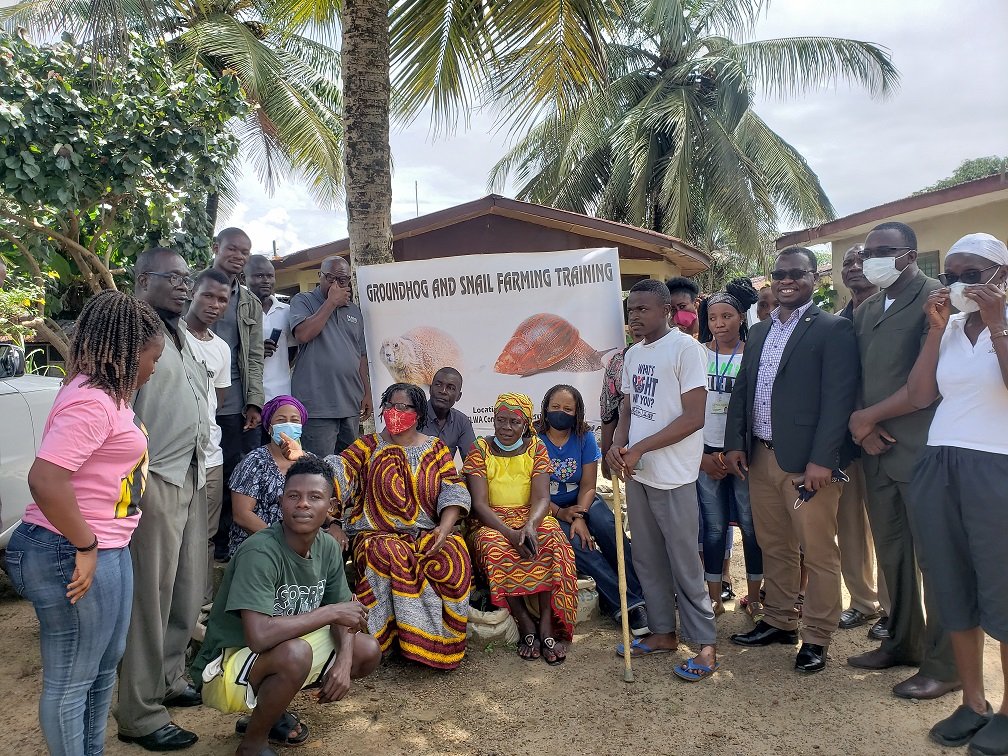Disabled folks to receive training in snails and groundhogs farming

In Liberia, people with disabilities endure the pain of neglect. They live as strangers in a society where they are to be treated equally. Public facilities are not designed to their needs, they are underrepresented in the Liberian workforce, and they are mostly perceived negatively, a situation leaving them to face life all by themselves.
According to the Elizabeth Legacy of Hope (ELH), a not-for-profit organization working to support child amputees in Sierra Leone and Liberia, and one of the few in India, 16 percent of the Liberian population has some sort of disability. 99 percent of them, according to the ELH, live in extreme poverty, compared to the Liberian population living in poverty as a whole. But Wede Agriculture Development Industry (WADI), a not-for-profit farming organization, has embarked on a journey that will see people with disabilities become their bosses of themselves.
Over the weekend, the group launched a nine-month programme on snails and groundhog farming for disabled people in Todee, Montserrado Count
Sophie Parwon, CEO of WADI, who stated the overview of the programme during its launching ceremony in the ELWA area, Paynesville, says that people with disabilities will be trained as Trainers of Trainers under the programme.
“These trainers will serve as extension officers for others who will be interested in farming snails or groundhogs,” she says.
She further adds that her organization will supervise the construction of a resource center for the disabled community in Todee, Montserrado County, who are the primary targets of the programme.
“For this grant, we are working with people with disabilities, and as a sustainable farming method for them, we are constructing a resource center for them. It will be a place for people of such kind to learn new income-generating skills like farming snails and groundhogs,” she says.
In Liberia, groundhogs or snails might not be the first to come to mind when thinking about venturing into animal farming. The two animals are known for their destructive behavior among farmers. Groundhogs, categorized as pests, eat plants grown on farms since they are herbivorous (primary source of food is plants). On the other hand, snails also eat young leaves of vegetable plants, a behavior, which also undermines the income flow of vegetable farmers.
Although they are known for vandalizing crops, the meat of both animals is among bush meat that Liberians consume. And it is for this reason WADI is working with people with disabilities during this time of the year.
“Most Liberians love snails and groundhog meat. It is rare to see a Liberian dish without any of these two types of meat; but, the market challenge is having these meats all year round. If we can farm them, we can meet the market demand all year round, and this will mean that our people will have a permanent source of income. That is what want to achieve through this programme” Sophie says in an exclusive interview after launching the programme.
Groundhogs and snails are gathered mainly from bushes or around farms and transported to urban markets. But Sophie believes that farming the animals would limit movement in their natural habitat.
“We are running out of snails and groundhogs because people are infiltrating into the bushes, disturbing their natural habitat. Our main reason for growing these two animals is for preservation purposes. By farming snails and groundhogs we minimize handpicking snails or hunting groundhogs in the bushes which is their natural habitat,” she says.
Also, Samuel K. Bokai, Coordinator of Small Grants at the United Nations Development Programme (UNDP), expressed his excitement about the project. He urged the disabled community in Todee to make the best of the opportunity that has come their way.
“I have visited the project site, and I am impressed with what I have seen. And I hope that when this project has ended, the beneficiaries will still be into business. This is what makes a project a success,” he says.
Flomo Himbye, Farm Manager of the Mission of Hope where the resource center is expected to be built, also lauded WADI for their move. Himbye says that building the capacity of people with disabilities builds their confidence and gives them a sense of inclusion in society.





